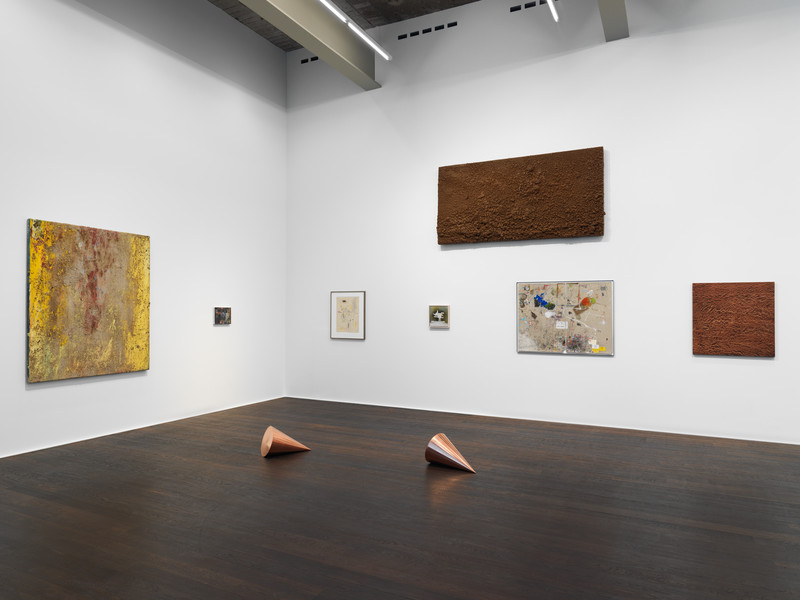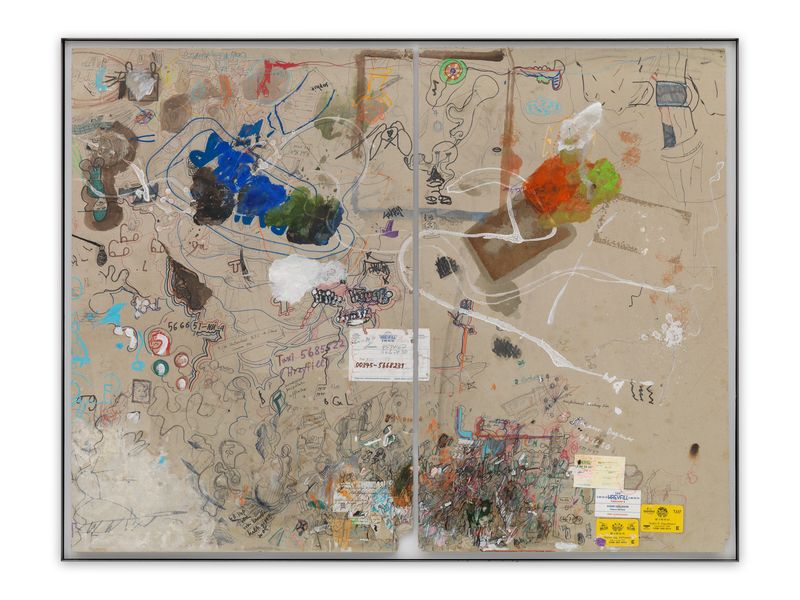
Tables, Carpets & Dead Flowers
17 November - 21 December 2018
Zürich
Installation views
Related Content
About the Artists

Roni Horn
Roni Horn’s work consistently generates uncertainty to thwart closure in her work. Important across her oeuvre is her longstanding interest to the protean nature of identity, meaning, and perception, as well as the notion of doubling; issues which continue to propel Horn’s practice.
Since the mid-1990s, Horn has been producing cast-glass sculptures. For these works, colored molten glass assumes the shape and qualities of a mold as it gradually anneals over several months. The sides and bottom of the resulting sculpture are left with the rough translucent impression of the mold in which it was cast. By stark contrast, the top surface is fire-polished and slightly bows like liquid under tension. The seductively glossy surface invites the viewer to gaze into the optically pristine interior of the sculpture, as if looking down on a body of water through an aqueous oculus. Exposed to the reflections from the sun or to the shadows of an overcast day, Horn’s glass sculpture relies upon natural elements like the weather to manifest her binary experimentations in color, weight and lightness, solidity and fluidity. The endless subtle shifts in the work’s appearance place it in an eternal state of mutability, as it refuses a fixed visual identity. Begetting solidity and singularity, the changing appearance of her sculptures is where one discovers meaning and connects her work to the concept of identity.
For Horn, drawing is a primary activity that underpins her wider practice. Her intricate works on paper examine recurring themes of interpretation, mirroring and textual play, which coalesce to explore the materiality of color and the sculptural potential of drawing. Horn’s preoccupation with language also permeates these works; her scattered words read as a stream of consciousness spiralling across the paper. In her ‘Hack Wit’ series, Horn reconfigures idiomatic turns of phrase and proverbs to engender nonsensical, jumbled expressions. The themes of pairing and mirroring emerge as she intertwines not only the phrases themselves but also the paper they are inscribed on, so that her process reflects the content of the drawings. Words are her images and she paints them expressionistically, which—combined with her method—causes letters to appear indeterminate, as if they are being viewed underwater.
Notions of identity and mutability are also explored within Horn’s photography, which tends to consist of multiple pieces and installed as a surround which unfolds within the gallery space. Examples include her series ‘The Selected Gifts, (1974 - 2015),’ photographed with a deceptively affectless approach that belies sentimental value. Here, Horn’s collected treasures float against pristine white backdrops in the artist’s signature serial style, telling a story of the self as mediated through both objects and others—what the artist calls ‘a vicarious self-portrait.’ This series, alongside her other photographic projects, build upon her explorations into the effects of multiplicity on perception and memory, and the implications of repetition and doubling, which remain central to her work.
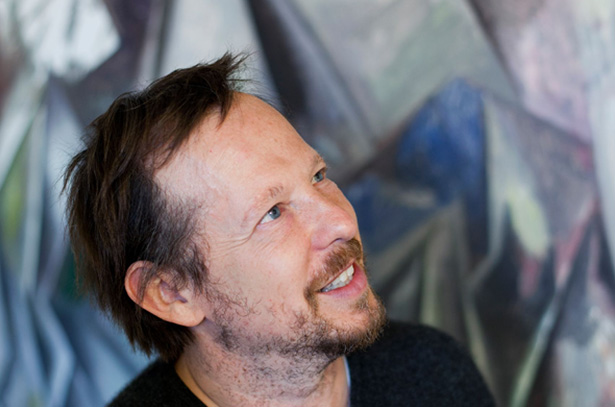
Guillermo Kuitca
Born in 1961 in Buenos Aires, where he continues to live and work, Argentine artist Guillermo Kuitca draws on a range of iconography, including architectural plans, maps, theaters, musical scores and domestic spaces to produce an oeuvre that explores themes of history, memory, structured absence, sound and silence and the tension between the empirical and abstract. Shifting from gestural mark-making to linear precision, Kuitca’s work mines varied aesthetic styles and histories, and in the latter half of his career, he has achieved significant acclaim for his deployment of a unique cubistoid style that masterfully reconciles abstraction with an illusionist form of figuration.
Exhibiting his first paintings at the age of thirteen at Lirolay Gallery in Buenos Aires, Kuitca quickly expanded his artistic practice by also studying drawing and theater direction. Early paintings from the 1980s incorporated theater imagery, informed by his experience in theater production and often explored themes of history, memory, migration, and domestic and communal spaces, before Kuitca later began to integrate architectural and cartographic subjects into his oeuvre. Having established himself as a leading figure in Buenos Aires’s art scene, in 1991—the same year that he founded his studio program in the city for residencies and young artists called Beca Kuitca—he staged his first solo museum exhibition in the United States, at the Museum of Modern Art in New York. A year later, he achieved further renown with his participation in documenta IX in Kassel, Germany—the first Argentine artist invited to documenta—where he displayed an installation of twenty mattresses.
The cubistoid style that Kuitca developed and that would emerge as the artist’s distinct visual language first appeared in his ‘Desenlace’ series, which he presented at the Argentine Pavilion at the 2007 Venice Biennale. Recalling a cubist aesthetic and eschewing figurative references, these segmented forms and angular patterns acted as the organizing principle of his compositions in this series and have recurred throughout his oeuvre ever since.
Recent, major solo exhibitions of Kuitca’s work include the Museo de Arte Contemporáneo Atchugarry, Uruguay (2023); Kunsthaus Pasquart, Biel, Switzerland (2017); Pinacoteca do Estado de São Paulo, Brazil (2014); The Drawing Center NY (2012); Hirshhorn Museum and Sculpture Garden, Washington D.C. (2010); and Walker Art Center, Minneapolis MN (2010).
Kuitca’s work is represented in distinguished museums and collections worldwide, including the Art Gallery of Ontario, Toronto; Art Institute of Chicago IL; Buffalo AKG Art Museum NY; Centre Pompidou, Paris; Dallas Museum of Art TX; Fondation Cartier pour l’art contemporain, Paris; Hirshhorn Museum and Sculpture Garden, Washington D.C; Kunsthaus Pasquart, Biel, Switzerland; Lille Métropole Musée d’art moderne, d’art contemporain et d’art brut; Los Angeles County Museum of Art CA; The Metropolitan Museum of Art NY; The Morgan Library & Museum NY; Musée d’Art Moderne Grand-Duc Jean, Luxembourg; Museo de Arte Moderno de Buenos Aires; Museo Jumex, Mexico City; Museo Nacional Centro de Arte Reina Sofía, Madrid; Museum of Fine Arts, Boston MA; Museum of Fine Arts, Houston TX; Museum of Modern Art NY; National Gallery of Victoria, Melbourne; Pérez Art Museum Miami, FL; Smithsonian Institution, Washington, D.C; Solomon R. Guggenheim Museum NY; Stedelijk Museum, Amsterdam; and Tate, London.
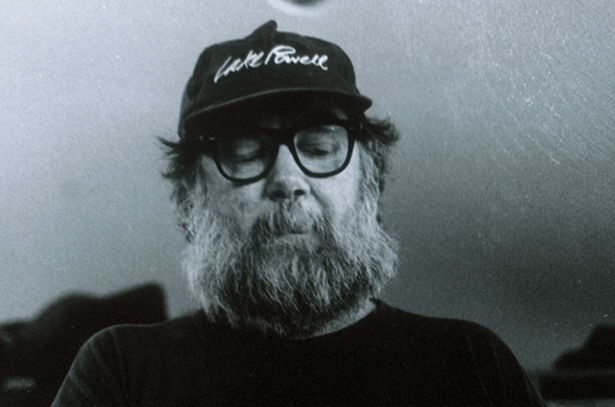
PAUL McCARTHY
Paul McCarthy is widely considered to be one of the most influential and groundbreaking contemporary American artists. Born in 1945, and raised in Salt Lake City, Utah, he first established a multi-faceted artistic practice, which sought to break the limitations of painting by using unorthodox materials such as bodily fluids and food. He has since become known for visceral, often hauntingly humorous work in a variety of mediums—from performance, photography, film and video, to sculpture, drawing and painting.
During the 1990s, he extended his practice into installations and stand-alone sculptural figures, utilizing a range of materials such as fiberglass, silicone, animatronics and inflatable vinyl. Playing on popular illusions and cultural myths, fantasy and reality collide in a delirious yet poignant exploration of the subconscious, in works that simultaneously challenge the viewer’s phenomenological expectations.
Whether absent or present, the human figure has been a constant in his work, either through the artist‘s own performances or the array of characters he creates to mix high and low culture, and provoke an analysis of our fundamental beliefs. These playfully oversized characters and objects critique the worlds from which they are drawn: Hollywood, politics, philosophy, science, art, literature, and television. McCarthy’s work, thus, locates the traumas lurking behind the stage set of the American Dream and identifies their counterparts in the art historical canon.
McCarthy earned a BFA in painting from the San Francisco Art Institute in 1969, and an MFA in multimedia, film and art from USC in 1973. For 18 years, he taught performance, video, installation, and art history in the New Genres Department at UCLA, where he influenced future generations of west coast artists and he has exhibited extensively worldwide. McCarthy’s work comprises collaborations with artist-friends such as Mike Kelley and Jason Rhoades, as well as his son Damon McCarthy.
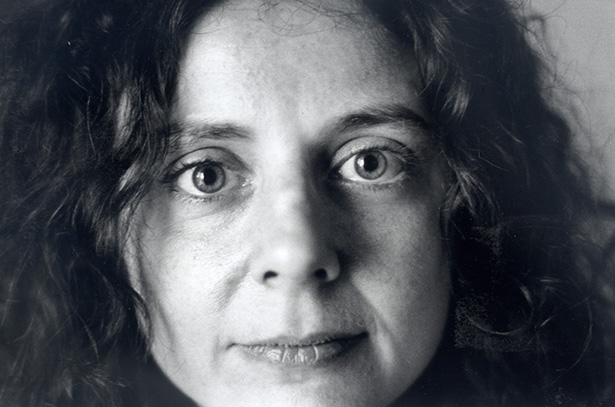
Lee Lozano
Lee Lozano’s paintings are admired for their energy, daring physicality and tirelessness in investigating the body and issues of gender. Although lauded by Lucy Lippard in 1995 as the foremost female conceptual artist of her time, Lozano had disengaged herself from the New York art world completely by the early 1970s. She left behind a body of work of striking formal breadth and complexity. Lozano fought to consolidate her artistic self in a realm void of systems, rules, and group consciousness. She pursued a wholly independent solo studio practice, which culminated in her rejection of the New York art world and a boycott of women. She first refused to attend public art world functions and withdrew from exhibitions, finally relocating to Dallas, Texas. ‘By refusing to speak to women,’ says Helen Molesworth, Chief Curator of LA MOCA, ‘she exposed the systematic and ruthless division of the world into categories of men and women. By refusing to speak to women as an artwork, she also refused the demand of capitalism for the constant production of private property… The strategy of rejection is a powerful one.’
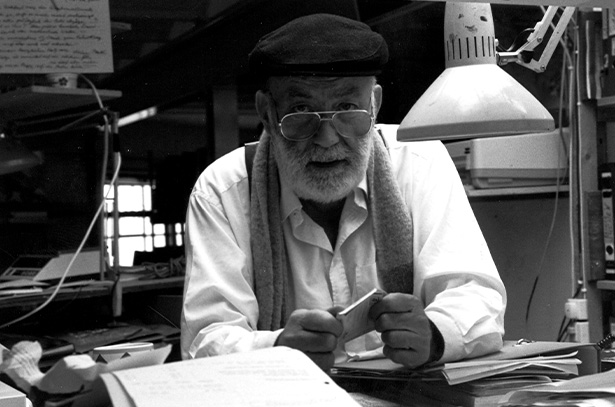
Dieter Roth
One of the most influential artists of the post-World War II period, Dieter Roth was born in Hanover, Germany, in 1930, to a German mother and a Swiss father, and died in Basel, Switzerland in 1998. Dieter Roth was an artist of an immense diversity and breadth, producing books, graphics, drawings, paintings, sculptures, assemblages, installations, audio and media works involving slides, sound recordings, film and video. He also worked as a composer, poet, writer and musician. He often collaborated with other artists, subverting the principle of authorship. Those partners included such significant figures as Richard Hamilton, Emmett Williams, Arnulf Rainer, and Hermann Nitsch. But it was Roth's long and symbiotic collaboration with his son, artist Björn Roth, that stands as testament to the enormous and enduring potency of his restless, relentless process.
Through much of his life, Roth was restlessly peripatetic, moving between studios in many cities. His two primary bases of activity—Iceland and Basel—were decidedly outside the mainstream. Throughout his career, the artist continually circled back to earlier ideas and processes, reinterpreting and transforming works so that linearity and closure are consistently defied. Transience and order, destruction and creativity, playful humor and critical inquiry, the abject and the beautiful, all maintain a consistent balance throughout his work.
Roth represented Switzerland at the 1982 Venice Biennale, and received a number of awards and prizes, including the 1991 Genevan Prix Caran d'Ache Beaux Arts, a prestigious Swiss prize. In 2004, The Museum of Modern Art and P.S.1 Contemporary Art Center in New York City jointly presented the major historical exhibition ‘Roth Time: A Dieter Roth Retrospective,’ a project co-organized with Schaulager Basel, Switzerland, and the Museum Ludwig of Cologne, Germany.
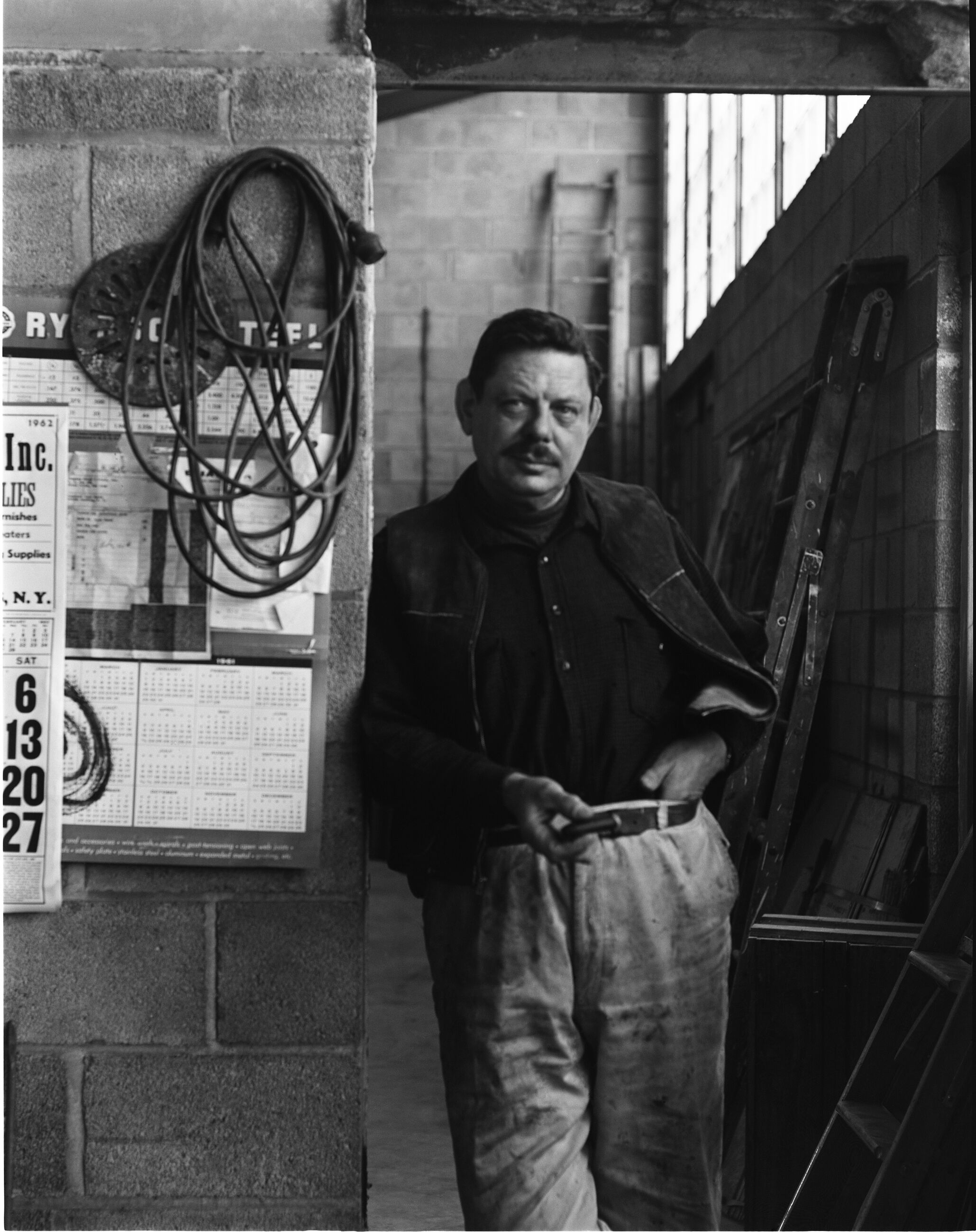
David Smith
David Smith is regarded as one of the most innovative artists and important American sculptors of the 20th century. He transformed sculpture by rejecting the traditional methods of carving and casting in favor of torch-cutting and welding, becoming the first artist known to make welded sculpture in America. These methods allowed him to work in an improvisational manner in creating open and large-scale, abstract sculptures. In his later years, he installed his sculptures in the fields of his home in the Adirondack Mountains, where a dialogue between the art object and nature emerged as central to his practice. His sculpture-filled landscape inspired Storm King Art Center and other sculpture parks throughout the world, as well as anticipating the land and environmental art movements.
Smith was born in 1906 in Decatur, Indiana. He worked briefly as a welder in an automobile factory before moving to New York City to become an artist in 1926. He studied painting at the Art Students league, where Cubism and Surrealism were foundational to his practice. He began welding sculpture around 1933 after seeing reproductions of constructed steel sculptures by Pablo Picasso and Julio González. He later became associated with the abstract expressionist movement and paved the way for minimalism with radically simplified, geometric works. Painting and drawing remained integral to what Smith called his ’work stream’. He embraced a holistic attitude toward artmaking and dismissed the idea of a separation between mediums. Acknowledging the tradition of painted sculpture throughout art history and drawing from the bold palettes of modernism and pop culture, Smith often painted his sculptures. David Smith died in 1965, leaving behind an expansive, complex, and powerful body of work that continues to exert influence upon subsequent generations of artists.
Smith began exhibiting his work as early as 1930. His first survey was organized by the Museum of Modern Art, New York in 1957. His sculpture was represented by the United States at the São Paulo Biennale in 1951 and at the Venice Biennale in 1954 and 1958. Posthumous retrospectives have been held at the Solomon R. Guggenheim Museum (1979 and 2006, which traveled to Tate Modern, London and the Centre Pompidou, Paris) and at the Los Angeles County Museum of Art (2011, which traveled to the Whitney Museum of American Art, New York and the Wexner Center for the Arts, Columbus, Ohio). Other major surveys have been organized at the Sezon Museum of Art, Tokyo (1994, traveled throughout Japan), the Museo Nacional Centro de Arte Reina Sofía, Madrid (1996), Storm King Art Center (1997–99), and Yorkshire Sculpture Park, Wakefield, UK. A three-volume, fully illustrated catalogue raisonné of Smith’s sculpture was published in 2021 by the Estate of David Smith and distributed by Yale University Press. A biography by Michael Brenson, David Smith: The Art and Life of a Transformational Sculptor, was published by Farrar, Straus, and Giroux in 2022.

Arshile Gorky
Arshile Gorky was born an ethnic Armenian in Khorkom, Van, Ottoman Empire (present-day Türkiye) in c. 1904. Fleeing the genocide that claimed the life of his mother, he immigrated to the United States as a teenage refugee in 1920. After four years with relatives in Massachusetts, Gorky moved to New York and changed his name in honor of the celebrated Russian poet. Refusing all categories, whether artistic or political, as necessarily reductive, Gorky forsook assimilation in favor of celebrating his otherness, becoming a central figure of the cultural milieu of a city on the brink of Modernism.
After a decade of working in New York, where he achieved a prominent position as a leading artist, Gorky initiated a series of studies and paintings observed from nature while on holiday in Connecticut first, and then over two summers at a farm in Virginia. Frequently returning to fragmentary and idealized elements of his early life, Gorky incorporated memories from his childhood as well as his adult fears and desires, among the reality of his surroundings.
Current Exhibitions
1 / 9




